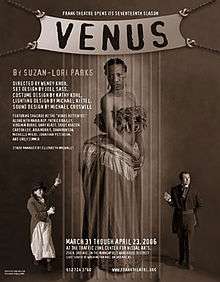Venus (play)
| Venus | |
|---|---|
 | |
| Written by | Suzan-Lori Parks |
| Characters | Sarah Baartman |
| Original language | English |
| Subject | Race and ethnicity |
| Setting | 19th-century London, england |
Venus (1996) is a play by Suzan-Lori Parks. It chronicles the fictional life-story of Sarah “Saartjie” Baartman, beginning from her life as an attraction for 19th century British audiences as the Hottentot Venus and ending with her death. It won 2 OBIE Awards in 1995-1996.[1]
Plot
Inspired by the true-life story of Sarah “Saartjie” Baartman, the play Venus provides a fictional account of her life abroad in 19th century London. She is lured away from her home in South Africa with the promise of riches and is put on display for British and Parisian audiences.[2] After being sold to the owner of a sideshow known as The Mother-Showman, she is exhibited for her steatopygia and is given the stage name "The Hottentot Venus." Baartman's "act" leads to a prospering business, with Europeans all over traveling to see the display of her genitalia and buttocks.[3] The Baron Docteur takes interest in Saartjie, who buys her from the Mother-Showman and takes her with him to Paris as his mistress.[4] However, the Baron Docteur has plans to study her steatopygia after her death. After she contracts gonorrhea from the Baron Docteur, he conspires with his Grade-School Chum to have her jailed until her death.[5] After her untimely death in the jail cell in Paris, a plaster cast of her body along with her skeleton is displayed at the Musée de l'Homme.[6]
Production history
Venus was produced by George C. Wolfe in conjunction with The Joseph Pall Public Theatre, The New York Shakespeare Festival, and the Yale Repertory Theatre.[1] It was directed by Richard Foreman, with Adina Porter as Saartjie Baartman and Peter Francis James as the Baron Docteur.[7]
Academic critique
The work was not intended to be truly historical, but rather use the concept of Baartman's career to explore colonization and objectification. As Parks described, "Most of it's fabricated... It's questioning the history of history... It embraces the unrecorded truth."[8] The work was examined by a number of scholars, including Lisa Anderson who analyzed it as a commentary on the femininity and sexuality of women of African descent.[9]
Criticisms
Theatre and cinema scholar Jean Young astutely critiques the play, stating that the ahistorical portrayal of Saartjie Baartman "reifies the perverse imperialist mind set, and her mythic historical reconstruction subverts the voice of Saartjie Baartman." She further points out the ironic re-objectification of Baartman in its attempt to portray her story. Other critiques argue that the portrayal actually objectifies the colonizers instead of the heroine.[8][10] New York Times critic Ben Brantley also stated that Parks "doesn't present Baartman as just an uncomprehending victim", implying that Parks had written Baartman in way that suggested that Baartman prolonged her own imprisonment for the sake of fame.[11] Conversely, Jennifer Larson writes that Baartman's character "certainly engages the imperial/hegemonic/white power with innovative and creative tactics, but these tactics are not historically unique."[12]
Awards
- 1995-1996 OBIE Award for Playwriting for Suzan-Lori Parks
- 1995-1996 OBIE Award for Distinguished Performance by an Actress for Adina Porter
References
- 1 2 "Venus". Lortel Archives. Retrieved 31 May 2014.
- ↑ Parks, Suzan-Lori (1998). Venus: a play. New York: New York: Dramatists Play Service, Inc. p. 18. ISBN 0822215675.
- ↑ Parks, Suzan-Lori (1998). Venus: a play. New York: New York: Dramatists Play Service, Inc. p. 39. ISBN 0822215675.
- ↑ Parks, Suzan-Lori (1998). Venus: a play. New York: New York: Dramatists Play Service, Inc. p. 94. ISBN 0822215675.
- ↑ Parks, Suzan-Lori (1998). Venus: a play. New York: New York:Dramatists Play Service, Inc. p. 145. ISBN 0822215675.
- ↑ Parks, Suzan-Lori (1998). Venus: a play. New York: New York Dramatists Play Service, Inc. p. 160. ISBN 0822215675.
- ↑ Parks, Suzan-Lori (1998). Venus: a play. New York: New York Dramatists Play Service, Inc. p. 3. ISBN 0822215675.
- 1 2 Philip C. Kolin (17 August 2010). Suzan-Lori Parks: Essays on the Plays and Other Works. McFarland. pp. 78–. ISBN 978-0-7864-5754-0.
- ↑ Lisa M. Anderson (January 2008). Black Feminism in Contemporary Drama. University of Illinois Press. pp. 56–. ISBN 978-0-252-03228-8.
- ↑ Young, Jean (1997). "The Re-Objectification and Re-Commodification of Saartjie Baartman in Suzan-Lori Parks's Venus". African American Review. 31 (5): 699–700. doi:10.2307/3042338.
- ↑ Brantley, Ben (May 3, 1996). "Of an Erotic Freak Show and the Lesson Therein". New York Times.
- ↑ Larson, Jennifer (2012). Understanding Suzan-Lori Parks. South Carolina: The University of South Caroline Press. p. 28. ISBN 978-1-61117-107-5.
External links
- Suzan-Lori Parks (1998). Venus. Dramatists Play Service. ISBN 978-0-8222-1567-7.
- Basting, Anne Davis. "Project MUSE - Venus (review)." Theatre Journal 49.2 (1997): 223-25. Project MUSE - Venus (review). The Johns Hopkins University Press. Web. 31 May 2014.